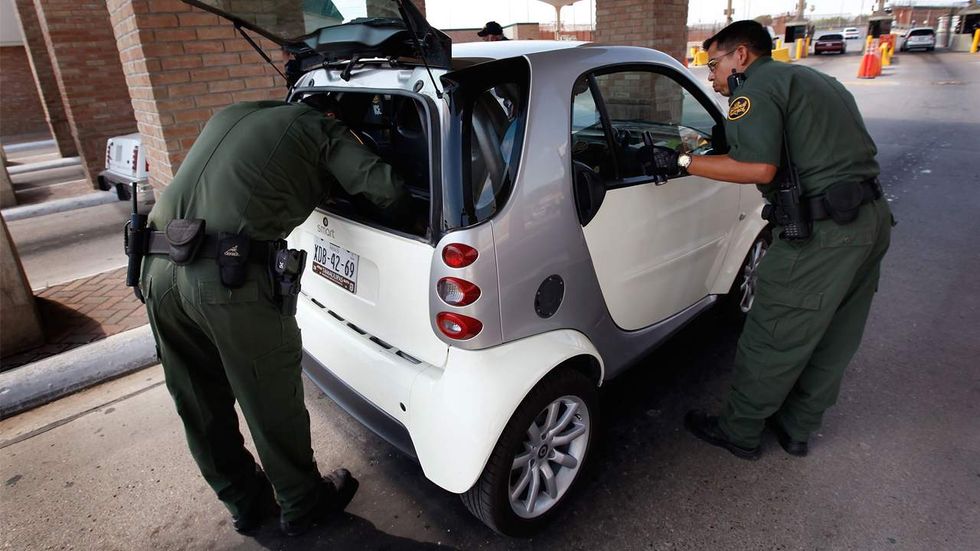
On May 25, four U.S. senators introduced legislation that would significantly expand the power of the federal government to seize citizens’ money when traveling in or out of the United States. (2010 file photo/Scott Olson/Getty Images)

Four U.S. senators have proposed legislation that would significantly expand the power of the federal government to seize citizens’ money when traveling in or out of the United States.
On May 25, Sens. Charles Grassley (R-Iowa), Dianne Feinstein (D-Calif.), John Cornyn (R-Texas) and Sheldon Whitehouse (D-R.I.) introduced in Congress the Combating Money Laundering, Terrorist Financing and Counterfeiting Act of 2017, legislation that makes it much easier for the federal government to seize assets transported overseas or into the United States.
The stated goal of the legislation is to make it more difficult for drug dealers, terrorists and other criminals to transport money and other “financial instruments” across the U.S. border, but several troubling provisions in the law could put law-abiding American citizens at risk of losing tens of thousands of dollars for doing nothing more than failing to fill out a government form.
Under current federal law, travelers transporting $10,000 or more in cash or other monetary instruments are required to report those funds to U.S. Customs and Border Protection. Failure to report funds, even if unintentional, can lead to the seizure of the money and criminal or civil penalties.
The Combating Money Laundering, Terrorist Financing and Counterfeiting Act would expand “monetary instruments” covered under current law to include “prepaid access devices, stored value cards, digital currencies, and other similar instruments.” This is particularly problematic because digital currencies, such as Bitcoin, are theoretically always transported by the owner of the digital currency account wherever he or she goes, which means digital currency owners with accounts valued at $10,000 or more must always report their funds or risk having them seized.
Even more troubling is the law treats all blank checks as though they are financial instruments valued in excess of $10,000 if the checking account contains at least $10,000, which means if a traveler accidently fails to report a blank check floating around in his or her luggage, the account holder could face stiff penalties — even if there is no suspicion of criminal activity.
If a traveler is believed to have deliberately concealed a blank check, even if no other criminal activities are alleged, it appears under the provisions of the proposed law he or she could face up to 10 years in prison.
[graphiq id="6sGR9f0wF6J" title="Asset forfeiture" width="500" height="357" url="https://sw.graphiq.com/w/6sGR9f0wF6J" frozen="true"]
A number of complex legal problems could also arise under the law’s provisions that could lead to innocent Americans losing their property. Under current federal law, through a process called civil asset forfeiture, citizens’ property can be seized if it is believed to have been involved in criminal activity, even if the owner of the property did nothing wrong.
In federal civil asset forfeiture cases, the burden of proof is only “preponderance of the evidence,” which means a prosecutor only needs to show it is more likely than not that property was involved in a crime for it to be seized.
For instance, if a person driving his or her parent’s vehicle has marijuana in the trunk, it’s possible the car could be seized regardless of whether the owner of the car had any idea it was being used for illegal activity.
Because the definition of “monetary instrument” would be greatly enhanced under the proposed law, it’s not inconceivable a person transporting a book of blank checks into the United States who deliberately chooses not to report the checks to the U.S. Customs and Border Protection agency could have the car the checks were found in seized, even if the car belongs to someone else who had no idea what had happened.
Despite these potential problems, Grassley said the law is necessary to fight terrorism and other organized criminal activities.
“Terrorist organizations, drug cartels, and other criminals are actively looking to exploit and harm Americans, whether by attacking our way of life, flooding our country with highly addictive drugs, or defrauding unknowing victims,” Grassley said in a news release. “The recent terrorist attack in the United Kingdom is the latest somber example of how real these threats are to our country and its allies. We must continue to fight them on every front, and that includes going after the profits of crime that are also used to fuel the ongoing activity of these diabolical enterprises. Our bill updates our money laundering laws for the 21st century.”
Justin Haskins